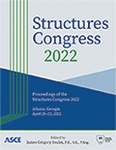Alkali-Silica Reaction Induced Damage and Strength Degradation in Textile Mill
Publication: Structures Congress 2022
ABSTRACT
Alkali-silica reaction (ASR) has been recognized as a potential cause of concrete degradation in the world since the 1940s. In Pakistan, mega hydropower structures like dams, weirs constructed from aggregates extracted from a local river bed, exhibited different levels of alkali-silica reactivity over an extended service period. The concrete expansion potential due to such aggregates has been categorized as slow-reactive. Apart from hydropower structures, ASR existence has been identified in the concrete structural elements of a textile mill building which used aggregates extracted from the nearby river bed. The original structure of the textile mill was erected in the 80s with addition of a textile “sizing and wrapping” hall constructed in the 90s. In the years to follow, intensive spalling was observed in the structural members of the subject hall, enough to threaten the overall stability of the building. Limitations such as incomplete building data posed hurdles during the detailed structural investigation. The paper lists observations made while assessing the extent of damage and its effect on the building hall structure. Core testing and petrographic tests were carried out as per the ASTM standards for strength degradation analysis followed by its root cause identification. Results confirmed significant structural strength reduction due to the presence of ASR, which necessitated the formulation of an immediate re-strengthening solution. The paper also discusses the possible tracks of rehabilitative measures likely to be adopted for structural stabilization and to seize further concrete expansion.
Get full access to this article
View all available purchase options and get full access to this chapter.
REFERENCES
Abbas, S., Kazmi, S. M. S., and Munir, M. J. (2017). “Potential of rice husk ash for mitigating the alkali-silica reaction in mortar bars incorporating reactive aggregates.” Construction and Building Materials, 132, 61–70.
“Alkali-activated cement subject to alkali-aggregate reaction.” (2021). ACI Materials Journal, 118(5).
Diamond, S. (1975). “A review of alkali-silica reaction and expansion mechanisms 1. Alkalies in cements and in concrete pore solutions.” Cement and Concrete Research, 5(4), 329–345.
Dunant, C. F., and Scrivener, K. L. (2012). “Effects of aggregate size on alkali–silica-reaction induced expansion.” Cement and Concrete Research, 42(6), 745–751.
Fournier, B., Ideker, J. H., Folliard, K. J., Thomas, M. D. A., Nkinamubanzi, P.-C., and Chevrier, R. (2009). “Effect of environmental conditions on expansion in concrete due to alkali–silica reaction (ASR).” Materials Characterization, 60(7), 669–679.
Gholizadeh Vayghan, A., Rajabipour, F., and Rosenberger, J. L. (2016). “Composition–rheology relationships in alkali–silica reaction gels and the impact on the gel’s deleterious behavior.” Cement and Concrete Research, 83, 45–56.
Hou, X., Kirkpatrick, R. J., Struble, L. J., and Monteiro, P. J. (2005). “Structural investigations of alkali silicate gels.” Journal of the American Ceramic Society, 88(4), 943–949.
Kawabata, Y., Dunant, C., Yamada, K., and Scrivener, K. (2019). “Impact of temperature on expansive behavior of concrete with a highly reactive andesite due to the alkali–silica reaction.” Cement and Concrete Research, 125, 105888.
Leemann, A., Shi, Z., Wyrzykowski, M., and Winnefeld, F. (2020). “Moisture stability of crystalline alkali-silica reaction products formed in concrete exposed to natural environment.” Materials & Design, 195, 109066.
Majid, C. M., Bhatti, T. J., and Chaudhry, M. N. (2013). ' Alkali silica reaction (ASR) potential of sand and gravels from NW-Himalayan rivers and their performance as concrete aggregate at three dams in Pakistan.” Sci. Int. (Lahore),25(4),893–899.
Munir, M. J., Qazi, A. U., Kazmi, S. M. S., Khitab, A., Ashiq, S. Z., and Ahmed, I. (2016). “A literature review on alkali silica reactivity of concrete in Pakistan'. Pak. J. Sci. 68 (1) 53–62.
Stranger, R. H. H. (1961). “Supplementary report on investigation of materials for concrete, rip rap and filters”, Mangla Dam Project.
Information & Authors
Information
Published In
History
Published online: Apr 18, 2022
Authors
Metrics & Citations
Metrics
Citations
Download citation
If you have the appropriate software installed, you can download article citation data to the citation manager of your choice. Simply select your manager software from the list below and click Download.
